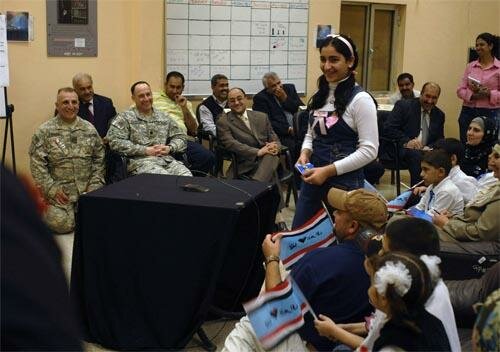Iraqi & American Children Make New Friends
November 25, 2008
Many of the children, who live and attend school in the communities surrounding Fort Hood, have parents who serve in the military. Many of them have seen their mothers or fathers or both head to war in Iraq or Afghanistan. Often they’ve heard their parents speak about the children they encounter in those countries and many of them are curious about the different culture that these children live in. Students at Nolanville Elementary School in Nolanville, Texas, grades 4 and 5 were able to learn more about their Iraqi counterparts on November 12 and in the process, were able to make new friends. All thanks to a video teleconference between the Iraqi and American school children. The program that day, began with opening remarks from Maj. General Jeffery Hammond, commanding general of the 4th Infantry Division and Multi-National Division-Baghdad.
“The school partnership program continues to build and grow in all directions,” said Hammond.1
Right now, there are approximately 31 Iraqi and American schools who are participating in the program. The schools here in the United States are in 11 different states. As part of the program, the students are able to exchange letters and emails with each other, as well as participate in video teleconferences. This enables students in Iraq and the US to learn about different cultures and develop more awareness of the differences as well as the similarities. The Iraqi students participating in the November 12th VTC were from the al Khartoum Primary School in the Shurta community of southern Baghdad. They gathered at FOB Falcon to participate in the VTC which allowed them to participate in a question and answer session with their American peers in Nolanville.
“My experience is that the young school-aged children in Iraq are no different than the children in America,” said Hammond, who explained that the program is designed to foster communications between Iraqi and American youths and develop a better understanding of the different cultures.2
Children from both countries were able to ask questions and make remarks about a vast number of subjects, such as school, life and culture in their respective countries. The children found that even though they were thousands of miles apart, that there were many similarities. Both children in America and Iraq have homework and chores. Both like hanging out with their friends and they both like chocolate ice cream.
“They’re not much different than us. They just dress a little different,” Essie Hubert, age 10 said. “They don’t care about the war. They still like us.”3
While the war in Iraq, touches both sets of children, it does so in very different ways. For the children in Nolanville, the war touches them because of parents, family members or friends being deployed. For the Iraqi children, they live in a combat zone and are impacted in a much different way.
“Do you hear sounds of gunfire all the time like we do, where you live?” one Iraqi boy asked the American students.4
The children were surprised to learn just how much they really knew about each other’s culture, as the VTC progressed. They found that they had many things in common and that despite the war, their daily lives were very similar as well.
“I was very pleased to talk to the American students, and I was well educated on how their educational system works,” said Aseel Mazin, a 12 year old girl. “I got to learn what their daily schedule is like too.”5
One difference that the American students learned, is that their Iraqi counterparts attended school from Sunday through Thursday for half days, while they of course, attend school for full days Monday through Friday. I’m sure that will get several of them asking their teachers if they can switch to half days of school. One American student asked their Iraqi counterpart about the Arabic language. After that question, an Iraqi student asked why American children do not learn the Arabic language in their school.
“It’s not really in our curriculum,” said Jordan Reed, daughter of Maj. T.J. Reed, Civil Affairs officer assigned to HHD 1st BCT, 4th ID. Her response brought laughter from those in attendance.6
These children are the future of Iraq and the United States. By participating in such events, I would hope that these children can bridge the gap of cultural difference that often cause older generations to embrace hate against the unknown. Our hope and the hope of Iraq, like in the hands of children like these. My hope is that this type of cultural exchange will foster long lasting friendships, which can someday change the world and make it a better place for future generations.
- http://www.forthoodsentinel.com/articles/2008/11/20/news/living/living04.txt [↩]
- http://www.forthoodsentinel.com/articles/2008/11/20/news/living/living04.txt [↩]
- http://www.forthoodsentinel.com/articles/2008/11/20/news/living/living04.txt [↩]
- http://www.forthoodsentinel.com/articles/2008/11/20/news/living/living04.txt [↩]
- http://www.forthoodsentinel.com/articles/2008/11/20/news/living/living04.txt [↩]
- http://www.forthoodsentinel.com/articles/2008/11/20/news/living/living04.txt [↩]
Comments
One Response to “Iraqi & American Children Make New Friends”
Got something to say?


 Subscribe
Subscribe



[...] Students at Nolanville Elementary School in Nolanville, Texas, grades 4 and 5 were able to learn more about their Iraqi counterparts on November 12 and in the process, were able to make new friends . All thanks to a video teleconference .. Read more [...]